mod-
(Latin: measure; suitable; size, limit, way, method; rhythm, harmony)
2. To be adaptable enough to allow something to take place without a major change.
3. To have sufficient space for someone or something.
4. To provide for or to supply a person or other people with a place to stay.
5. To adapt to a new suitable situation.
6. To give someone money in response to a request for a loan.
7. Etymology: from Latin accomodatus, "suitable"; from accomodare, "to make fit, to adapt, to fit one thing with another thing"; from ad-, "to" + commodare "to make fit"; from commodus, "fit, suitable".
2. A seat, a compartment, or a room on a public vehicle.
3. A reconciliation or a settlement of opposing views or the modification of actions in response something.
4. The automatic adjustment in the focal length of the lens of the eye to permit retinal focus of images of objects at varying distances.
5. A financial favor, such as a loan of money; especially, by a financial institution as a favor to someone before a formal credit arrangement is made.
Variation of the amplitude modulation of a carrier wave, commonly a radio wave, presents fluctuations in the audio or video signals that are being transmitted.
A higher amplitude modulation wave is interpreted as a "1" and a normal wave is interpreted as a zero.
The method of changing an amplitude modulation is known as "amplitude shift keying", or ASK.
2. A chair or box-shaped piece of furniture holding a chamber pot covered by a lid.
3. A movable washstand with a cupboard underneath containing a chamber pot or washbasin.
4. A plumbing fixture for defecation and urination; a toilet.
5. Etymology: "chest of drawers," earlier (1680's) a fashionable ladies' headdress, from French, commode, "convenient, suitable"; from Latin commodus, "proper, fit, appropriate, convenient, satisfactory"; from com-, "with, together" + modus, "convenient; suitable; measure".
2. Generous or large in area or extent: Ellen and Ted were so happy to be able to move into a commodious apartment with four rooms after living in a modest, simple, and tiny place for more than a year.
3. Etymology: "beneficial, convenient", from Medieval Latin commodiosus, "convenient, useful", from Latin commodus, "proper, fit, appropriate, convenient, satisfactory"; from com-, "together, together with" + modus, "measure, manner".
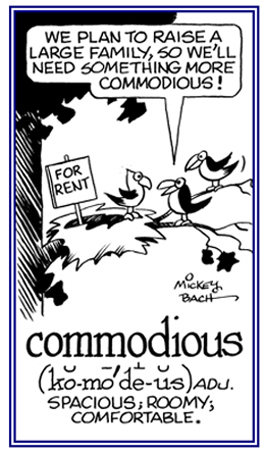
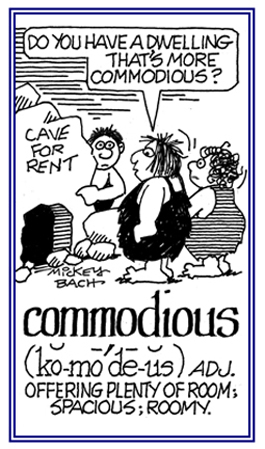
Go to this Word A Day Revisited Index
so you can see more of Mickey Bach's cartoons.
2. Etymology: Although "commodious" now means "roomy", in the 16th century it was normally used to mean "handy" or "serviceable" which is a meaning that is closer to the word's Latin origin of commodum, "convenience".
2. An article of trade or commerce; especially, an agricultural or mining product which can be processed and resold: Oil, being a mineral people cannot live without in this present age, is a highly valued commodity because its price generally keeps getting higher.
3. Etymology: in the 15th century, "benefit, profit, welfare"; later "a convenient or useful product"; from Middle French commodité, "benefit, profit"; from Latin commoditatem, commoditas, "fitness, adaptation, convenience, advantage"; from commodus, "suitable, convenient"; and ultimately from com-, "with, together" + modus, "measure, manner".

Go to this Word A Day Revisited Index
so you can see more of Mickey Bach's cartoons.
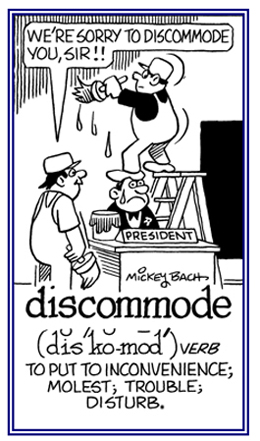
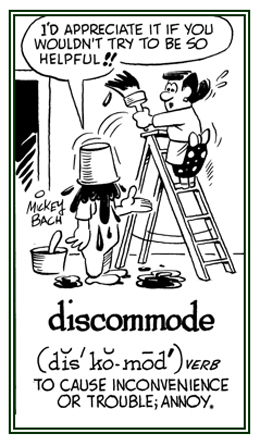
Go to this Word A Day Revisited Index
so you can see more of Mickey Bach's cartoons.
2. A descriptive term for causing (someone or people) trouble or inconvenience.
2. Variation of the frequency of a carrier wave (commonly a radio wave) in accordance with variations in the audio signal being sent.
Developed by American electrical engineer Edwin H. Armstrong in the early 1930's, FM is less susceptible to outside interference and noise; such as, thunderstorms, nearby machinery, etc. than is AM.
Such noise generally affects the amplitude of a radio wave but not its frequency, so an FM signal remains virtually unchanged.
FM is also better able to transmit sounds in stereo than AM and commercial FM broadcasting stations transmit their signals in the frequency range of 88 megahertz (MHz) to 108 MHz.
2. Descriptive of exceeding the normal or appropriate limits; extreme: The immoderate talking by the students made it impossible for the teacher to continue with her lesson.
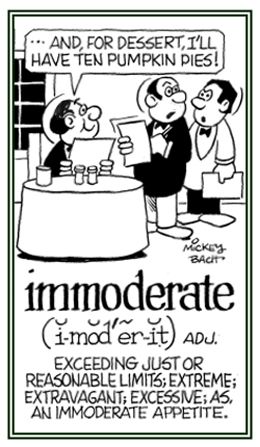
Go to this Word A Day Revisited Index
so you can see more of Mickey Bach's cartoons.
2. Relating to a degree that exceeds the bounds of reason or moderation.
3. Descriptive of being excessively unreasonable.
2. Exceeding the normal or not having suitable limits: Hank's eating habits were considered to be acts of immoderation.

